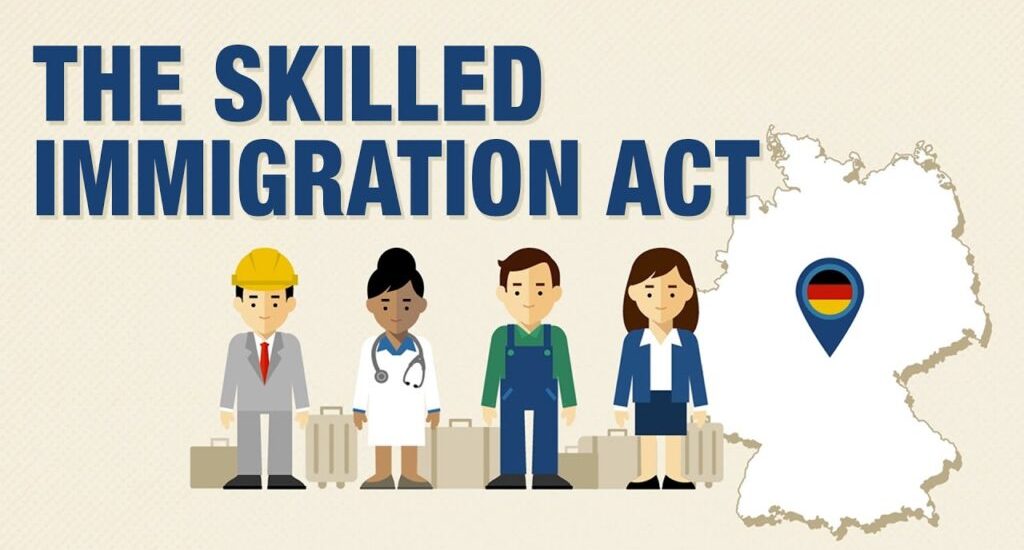The battle to make lighter life-saving body armour
- December 25, 2015
- Posted by: noye
- Category: Uncategorized

Good skilled workers are an asset for Germany: The Immigration Act for Skilled Workers (Fachkräfteeinwanderungsgesetz – FEG) came into force on 1 March 2020, and is to boost the immigration of qualified individuals from abroad. The Federal Office has also received new tasks as a result of the Act.
The Act has simplified the legal regulations for the immigration of skilled workers from third countries. Entry restrictions due to the Covid-19 pandemic currently make it difficult to enter the country from outside Europe, but exemptions apply to skilled workers.
The Federal Office for Migration and Refugees is involved in the skilled workers’ immigration process in a variety of ways. Its portfolio has been expanded by the Act. See the video on the immigration of skilled workers at the Federal Office:
variety of ways. Its portfolio has been expanded by the Act. See the video on the immigration of skilled workers at the Federal Office:
Information and advice for skilled workers
In addition to immigrants, the Federal Office also advises companies and authorities on the provisions regarding entry and residence, professional recognition and language training via the Working and Living in Germany hotline (ALiD).
Enabling EU mobility and facilitating research migration
With regard to the law on residence, the Federal Office is operationally active as the National Contact Point for EU Mobility with regard to the EU Blue Card, ICT (intra-corporate transfer), REST (researchers and students), and long-term EU residence. The Act has assigned to the Federal Office responsibility for establishing the preconditions for mobility within the framework of ICT and REST. This was previously the responsibility of the immigration authorities. Within the context of research migration, the Federal Office acts as the secretariat of the Advisory Board for Research Migration, and as an office for the recognition of research institutions.
Promoting the integration of skilled workers
As a central player in integration, the Federal Office provides a wide range of support opportunities for the period after entry into the country.
For instance, the Migration Advice Service for Adults (MBE), which is managed by the Federal Office, offers free advice on issues such as finding accommodation or health insurance. The MBE Advice Centres can be found in many cities in Germany (https://bamf-navi.bamf.de/de), and can also be reached online at www.mbeon.de. The aim is to expand the MBE’s services to include skilled workers and family members relocating with them. In terms of labour market integration, the “Integration through Skill-Building” (IQ) support programme managed by the Federal Office helps to mobilise the potential of skilled workers. People with a foreign vocational qualification are advised, guided, and if necessary (re)qualified, on issues relating to the recognition of their qualifications. “Regional skilled workers’ networks” have been set up, underpinned by the Act, and these also include advising employers on how to attract skilled workers.
Moreover, the BAMF also runs the nationwide regulatory instrument for vocational German language promotion, that is the vocational language courses. These courses improve immigrants’ chances on the labour market. The target group comprises skilled workers, including people who are going through the recognition procedure for the vocational or training qualification that they have acquired abroad. The Act extended the tasks relating to admission to the vocational language course for people who are preparing for vocational training. Applications from abroad are also made possible for this target group. You can find information on this in the article entitled “The vocational language courses of the Federal Office”. The Federal Office provides skilled workers as well as family members relocating with them who do not have an adequate knowledge of German with integration courses leading to language level B1 (CEFR), enabling them to acquire basic knowledge of history, the legal system, as well as culture and societal structures.
Research on the immigration of skilled workers
The operational tasks of the Federal Office are supplemented by a variety of studies carried out by the Research Centre in which, amongst other things, topics are analysed that are relevant to the immigration of skilled workers. The Federal Government’s annual Migration Report, as well as various monitoring reports, also comprehensively monitors educational and labour migration to Germany. A study entitled “Non-academic foreign skilled workers on the German labour market. A stock-taking exercise carried out prior to the entry into force of the Immigration Act for Skilled Workers” was published in February 2020, and considers how the employment of this group of individuals had developed under the previous legal provisions, and what role the vocational training of migrants can play when it comes to attracting skilled workers. It also presents the new provisions contained in the Act, as well as the analyses and forecasts available to date on the demand for skilled workers in Germany. In addition, a project accompanying the Act was launched in January 2021 in which in-depth insights into the new procedures for attracting skilled workers are to be generated through surveys carried out in selected immigration authorities and missions abroad, as well as by analysing data from the Central Register of Foreigners and visa data.
Further information:
- The Federal Office’s homepage offers an overview of the legal requirements for entry to and residence in Germany in accordance with the Act under the heading Migration & residence.
- Information on the exemptions for skilled workers from the corona-related entry restrictions that are currently applicable can be found on the website of the Federal Ministry of the Interior, Building and Community.

